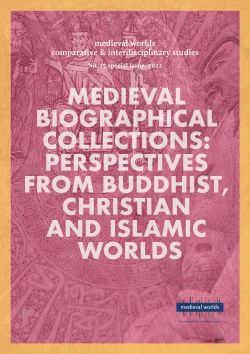Giorgia Vocino
S. 195 - 213
doi:
10.1553/medievalworlds_no15si_2022s195
Verlag der Österreichischen Akademie der Wissenschaften
doi:
10.1553/medievalworlds_no15si_2022s195
Abstract:
In the decades around 1000, an anonymous cleric at Milan Cathedral wrote a booklet on the history of his city which he built as a collection gathering, in chronological order, the Lives of the local bishops. The unfinished work not only testifies to the learning and culture of the author but also to the historical relevance of an ambitious text commissioned to support the political claims and the legitimacy of the Milanese church in its quest for primacy in the kingdom of Italy. This chapter explores the refined style of the author and the ways in which he constructed a coherent and cohesive narrative by sewing together individual biographies. The medieval reception of this biographical collection also shows the ways in which the text was repurposed to fulfil different functions and multiple goals, both within and beyond the city of Milan. Finally, this study analyses the text in the light of two interpretative concepts borrowed from the field of social anthropology. De situ clearly appealed to the literary tastes of the scholars trained in the cathedral school, thus addressing an audience shaped as a specific »community of learning«. More generally, the collection contributed to nourishing the sense of identity of the clergy and the people of Milan, that is a »textual community« which, through the acts of reading and listening to the text, felt it belonged to that glorious history and expected to see its reflection in the present.
medieval Italy, Church history, hagiography, institutional history, manuscript studies, textual transmission, rhetoric, communities of learning, textual communities, history of origins
Published Online:
2022/06/08 10:22:42
Object Identifier:
0xc1aa5576 0x003d78a9
Rights:https://creativecommons.org/licenses/by-nd/4.0/
medieval worlds provides a forum for comparative, interdisciplinary and transcultural studies of the Middle Ages. Its aim is to overcome disciplinary boundaries, regional limits and national research traditions in Medieval Studies, to open up new spaces for discussion, and to help developing global perspectives. We focus on the period from c. 400 to 1500 CE but do not stick to rigid periodization.
medieval worlds is open to submissions of broadly comparative studies and matters of global interest, whether in single articles, companion papers, smaller clusters, or special issues on a subject of global/comparative history. We particularly invite studies of wide-ranging connectivity or comparison between different world regions.
Apart from research articles, medieval worlds publishes ongoing debates and project and conference reports on comparative medieval research.
Medieval Biographical Collections: Perspectives from Buddhist, Christian and Islamic Worlds
Guest editors: Daniel Mahoney, Diarmuid Ó Riain and Giorgia Vocino
Editorial
Walter Pohl and Ingrid Hartl
Introduction
Medieval Biographical Collections in Comparison
Daniel Mahoney and Giorgia Vocino
Introductory Comparative Chapters
Compilation Strategies
Daniel Mahoney and Diarmuid Ó Riain
Writing Strategies
Reinier Langelaar, Giorgia Vocino and Veronika Wieser
Audience and Reception
Rutger Kramer and Graeme Ward
Case Studies
Many Lives, One Story: The Gesta Sanctorum Rotonensium and the Making of Redon
Rutger Kramer
Biography and Hierarchy: The Tibetan Ruling House of Phag-mo-gru and the Singular Volume of the Rlangs (Rlangs-kyi-po-ti-bse-ru)
Reinier Langelaar
Reading Jerome’s De viris illustribus in the Post-Roman World: Cataloguing Community in Gennadius of Marseille and Frechulf of Lisieux
Graeme Ward and Veronika Wieser
Shaping Community through Biographical Collections from South Arabia: A Comparison of Two Ṭabaqāt-works
Johann Heiss
Compiling the Deeds of Salzburg Saints: The 12th-Century De episcopis Salisburgensibus and the Monastery of Admont
Diarmuid Ó Riain
Obituaries in Service of the Rasūlid Sultanate in Yemen at the Turn of the 9th/15th Century
Daniel Mahoney
Creating a Sense of Glorious Destiny. Mastery of Speech in the Libellus de Situ Civitatis Mediolani (Late 10th-Early 11th Centuries)
Giorgia Vocino
Conclusion
Communities and Contexts: Concluding Thoughts on Medieval Biographical Collections
Diarmuid Ó Riain




 Home
Home Print
Print
 References
References
 Share
Share
